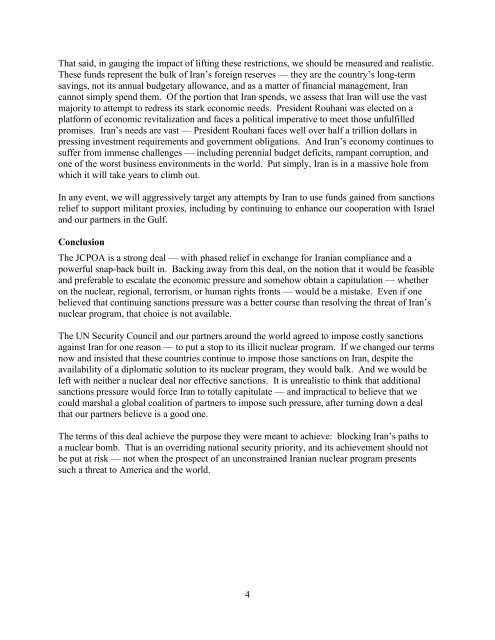WHAT YOU NEED TO KNOW ABOUT THE JCPOA
jcpoa_what_you_need_to_know
jcpoa_what_you_need_to_know
- No tags were found...
Create successful ePaper yourself
Turn your PDF publications into a flip-book with our unique Google optimized e-Paper software.
That said, in gauging the impact of lifting these restrictions, we should be measured and realistic.These funds represent the bulk of Iran’s foreign reserves — they are the country’s long-termsavings, not its annual budgetary allowance, and as a matter of financial management, Irancannot simply spend them. Of the portion that Iran spends, we assess that Iran will use the vastmajority to attempt to redress its stark economic needs. President Rouhani was elected on aplatform of economic revitalization and faces a political imperative to meet those unfulfilledpromises. Iran’s needs are vast — President Rouhani faces well over half a trillion dollars inpressing investment requirements and government obligations. And Iran’s economy continues tosuffer from immense challenges — including perennial budget deficits, rampant corruption, andone of the worst business environments in the world. Put simply, Iran is in a massive hole fromwhich it will take years to climb out.In any event, we will aggressively target any attempts by Iran to use funds gained from sanctionsrelief to support militant proxies, including by continuing to enhance our cooperation with Israeland our partners in the Gulf.ConclusionThe <strong>JCPOA</strong> is a strong deal — with phased relief in exchange for Iranian compliance and apowerful snap-back built in. Backing away from this deal, on the notion that it would be feasibleand preferable to escalate the economic pressure and somehow obtain a capitulation — whetheron the nuclear, regional, terrorism, or human rights fronts — would be a mistake. Even if onebelieved that continuing sanctions pressure was a better course than resolving the threat of Iran’snuclear program, that choice is not available.The UN Security Council and our partners around the world agreed to impose costly sanctionsagainst Iran for one reason — to put a stop to its illicit nuclear program. If we changed our termsnow and insisted that these countries continue to impose those sanctions on Iran, despite theavailability of a diplomatic solution to its nuclear program, they would balk. And we would beleft with neither a nuclear deal nor effective sanctions. It is unrealistic to think that additionalsanctions pressure would force Iran to totally capitulate — and impractical to believe that wecould marshal a global coalition of partners to impose such pressure, after turning down a dealthat our partners believe is a good one.The terms of this deal achieve the purpose they were meant to achieve: blocking Iran’s paths toa nuclear bomb. That is an overriding national security priority, and its achievement should notbe put at risk — not when the prospect of an unconstrained Iranian nuclear program presentssuch a threat to America and the world.4


